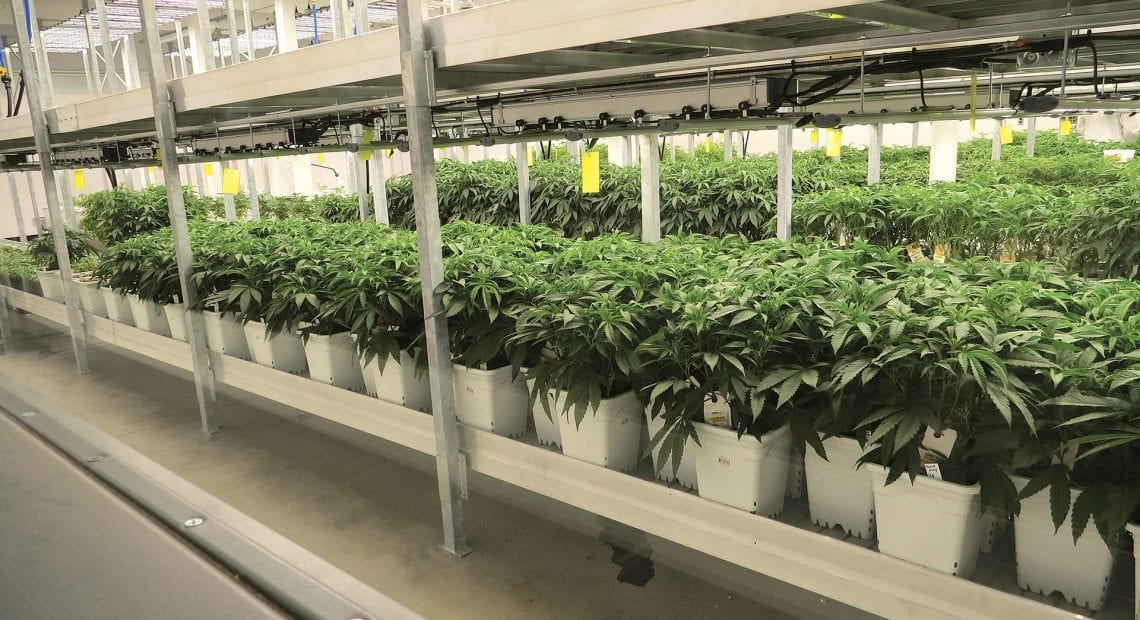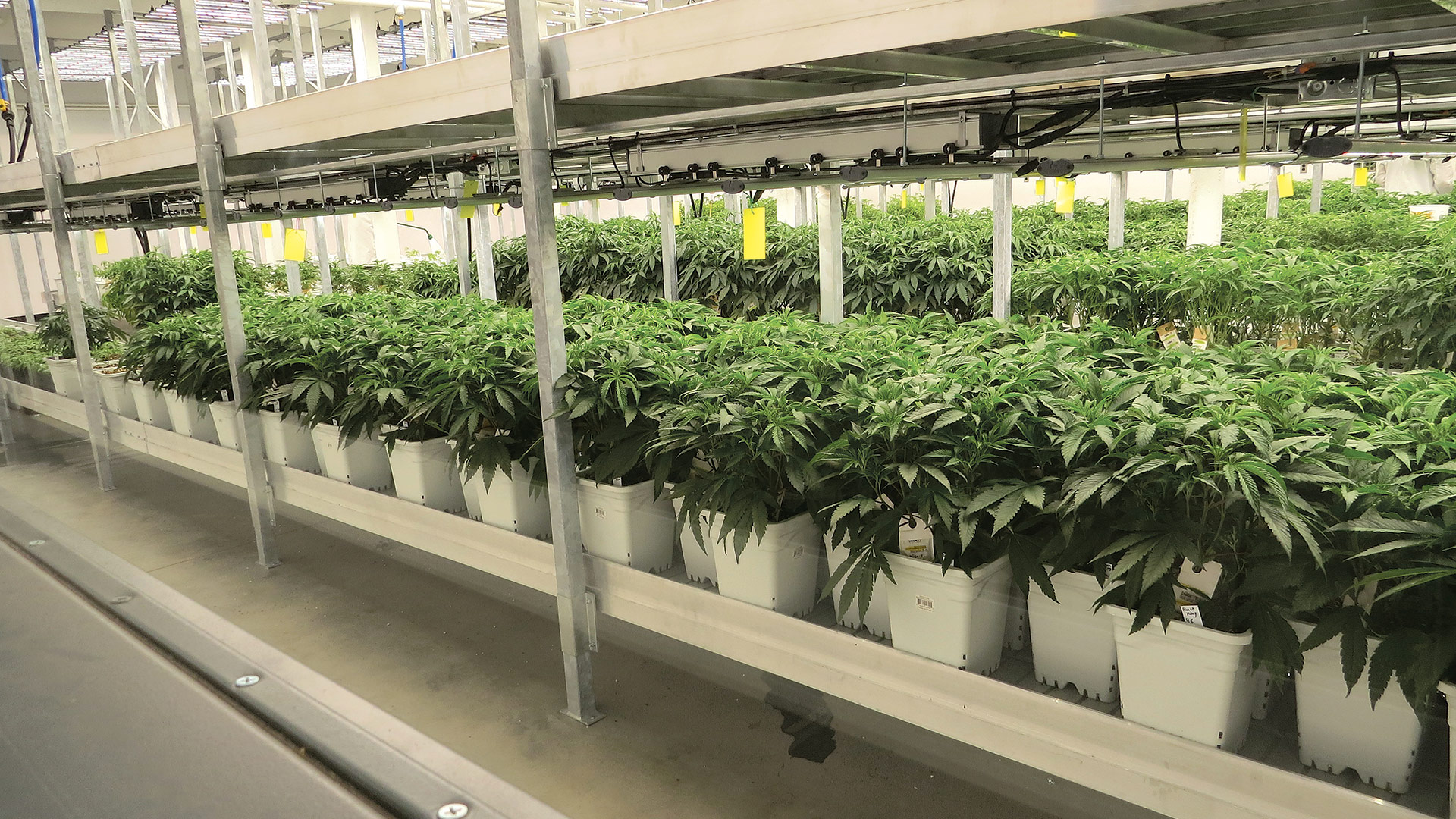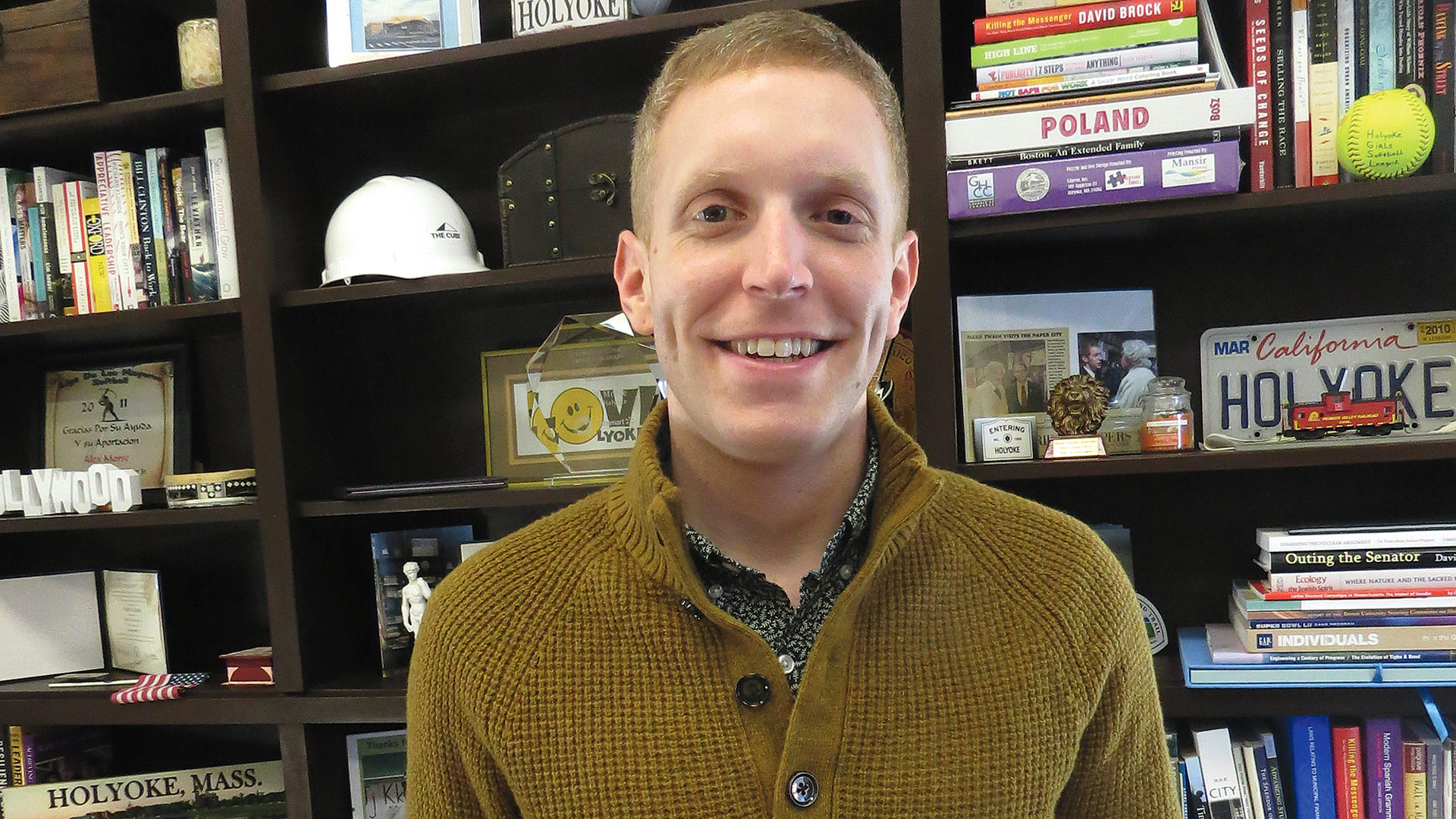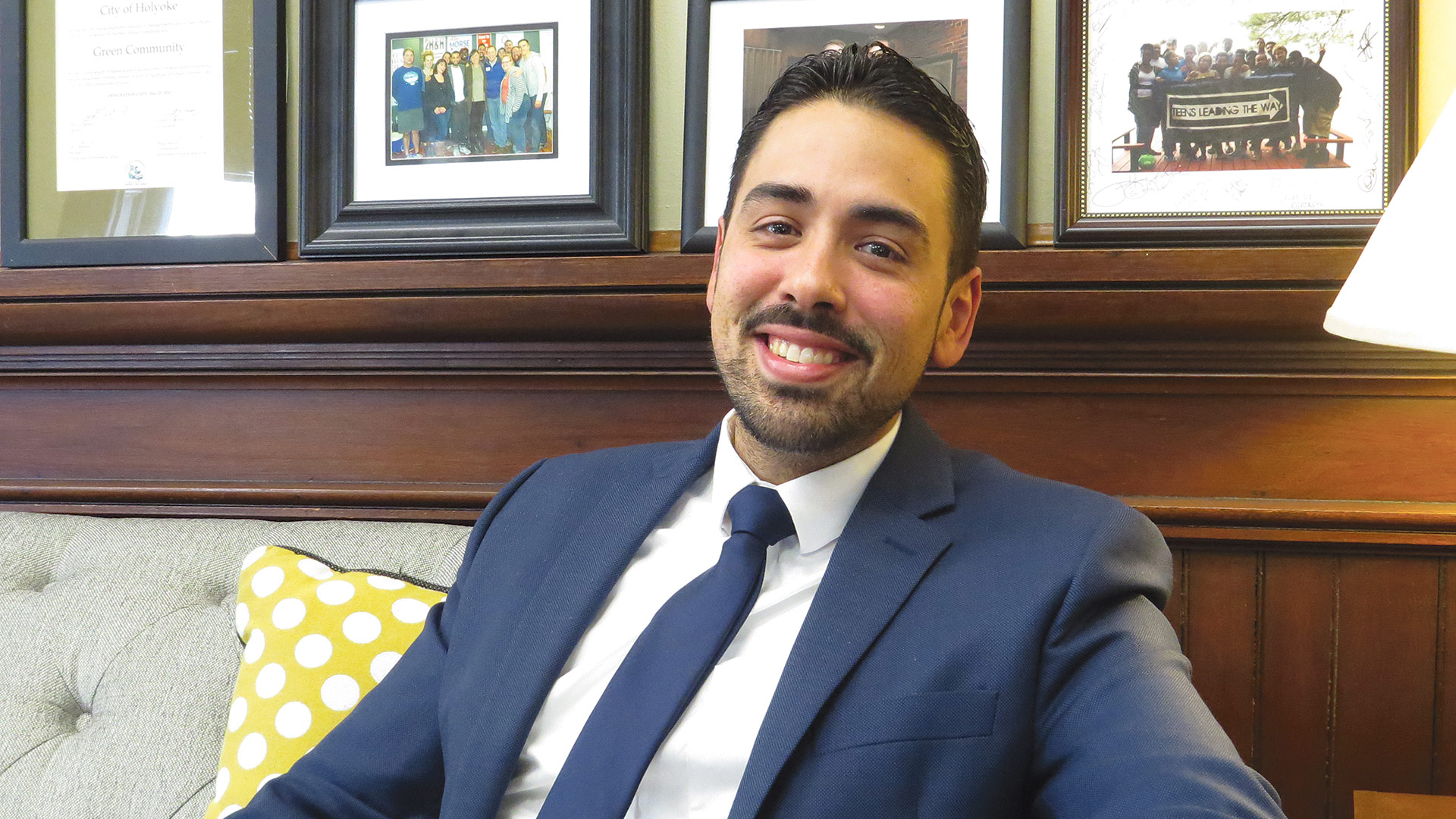
Cannabis Industry Puts Down Roots in Holyoke
Community Spotlight

GTI’s cultivation facility in Holyoke has been operating since last summer, and many new ventures could be opening in the years ahead.
Alex Morse says his phone was already ringing — quite frequently, in fact — before he was interviewed on CBS This Morning late last June.
But then, it really started ringing. And his e-mail box became even more crowded.
That’s because, with that report, Holyoke’s efforts to roll out the welcome mat for the cannabis industry, pun intended, became a national story rather than a local story — although it was already well-known.
Yes, this was the detailed report where Morse told CBS that the city once known as the ‘Paper City’ might soon be known as the ‘Rolling Paper City.’ His tongue wasn’t in his cheek, and there was a broad smile on his face as he said it.
Getting serious, or more serious, because he was already serious, he told CBS, “it’s legal … people need to wake up; the days of the past are moving forward. Holyoke has embraced the industry, and we acknowledge that this is an economic-development driver for us.”
Morse, and Holyoke, woke up long ago, meaning just after (or maybe even before) recreational marijuana became legal in Massachusetts in the fall of 2016, and today it is making giant strides toward creating what officials are calling a ‘cannabis cluster.’
And they’re comparing it, in some ways, to the cluster that put this city on the map — figuratively and quite literally (this was a planned industrial city) — the paper and textiles cluster.
As they used that word ‘cluster,’ both Morse and Marcos Marrero, the city’s director of Economic Development, said it means more than the creation of a number a number of businesses and jobs in a specific sector, although that’s a big part of it. It also means establishment of an infrastructure of support services that can have a large multiplier effect, if you will.
“With a cluster, it’s more than the sum of its parts,” Marrero explained. “Once you have a cluster, then you have an expertise, just like Holyoke did when it was the Paper City. Just as you have an expertise with paper, you can have an expertise with all the expects of this [cannabis] business.”
Elaborating, he said cannabis-cultivation facilities require highly specialized construction, lighting, anti-contamination, air-movement, and security systems, and all this adds up to opportunities for companies in this area that can handle such work.
In many ways, Holyoke is well on its way to seeing this cannabis cluster become reality, said Morse, noting that one large cultivation facility, Green Thumb Industries (GTI), is currently operating in a former textile mill on Appleton Street. And there are several other businesses across the wide spectrum of this business — from cultivation to retail — moving their way through the involved process of getting permitted to operate and eventually absorbing some of the vast amounts of commercial real estate that are vacant or underperforming.
Holyoke at a Glance
Year Incorporated: 1786
Population: 40,341
Area: 22.8 square miles
County: Hampden
Residential Tax Rate: $19.29
Commercial Tax Rate: $39.87
Median Household Income: $36,608
Median family Income: $41,194
Type of Government: Mayor, City Council
Largest Employers: Holyoke Medical Center, Holyoke Community College, ISO New England Inc., PeoplesBank, Universal Plastics, Marox Corp.
* Latest information available
“For us, cannabis is another form of manufacturing that’s bringing buildings back to life, being a revenue generator and job creator,” said the mayor.
And as they say in the agriculture business, Holyoke is certainly fertile ground for the cannabis industry. Indeed, it boasts, by the mayor’s estimate, 1.5 million square feet of vacant or underutilized former mill properties. Meanwhile, it has, again, by Morse’s calculations, the lowest electricity rates in the state (Holyoke has its own municipal utility), and it has something just as important as those ingredients — a giant, figurative ‘welcome’ sign when it comes to this business, as will become clear later.
But cannabis isn’t the only positive development in this city. Holyoke is also making great strides in ongoing efforts to attract entrepreneurs and arts-related businesses. It is also convincing more people, especially the younger generations, that this is a place to live as well as work and operate a business. And it’s seeing many of those aforementioned mills being put to creative and momentum-building uses.

Mayor Alex Morse, an early supporter of the cannabis industry, says its many components collectively form an economic driver in Holyoke.
All of the above can be seen in one high-profile project known as the Cubit Building, the structure on Race Street that takes that shape. The first two floors are now occupied by the Holyoke Community College MGM Culinary Arts Institute, a story that embodies education, workforce development, and economic development, and in the floors above are apartments that were leased out even quicker than the optimistic owners thought they would.
“You drive by at night, and it’s all lit up,” said the mayor. “People are living on the top two floors, and on the first two floors you see students in the chefs’ hats cooking and doing classes; there’s a lot of vibrancy on Race Street.”
Lights are coming on all over Holyoke, and for this, the latest installment of its Community Spotlight series, BusinessWest examines how this has come about and why Holyoke is creating a buzz — in all kinds of ways.
Budding Ventures
As noted, this cannabis cluster is a solid work in progress, with GTI now approaching a full year in business and several other projects in various stages of development.
Conducting one of those ‘if-all-goes-well’ exercises, Morse said he can envision a cluster that generates perhaps 300 to 400 jobs and many types of businesses, from cultivation facilities to cannabis cafés like those in Amsterdam. If that picture comes to fruition, marijuana-related businesses would constitute economic development in many different ways, from jobs to tax dollars; from revving up the real-estate market (aspiring ventures have acquired options on a number of properties) to giving tourism a boost; from creation of support businesses to helping give Holyoke a new brand.
As Morse told CBS — and BusinessWest — cannabis has become an economic driver. And city officials have had a lot to do with this by being so aggressive, welcoming, and accommodating.
As one example, Morse and Marrero cited the host-community agreements that such businesses traditionally sign in order to set up shop. Some communities have been excessive in their requests (or demands), while Holyoke has taken a different tack.
“These agreements have become another choking point for the industry,” said Marrero. “Communities try to negotiate, they go back and forth, and hold you down for a bunch of criteria. We’ve been very transparent and said, ‘we’re going to go for the maximum allowable benefits for the community by law in terms of impact fee, and if you sign here, you have a host-community agreement; we don’t become an impediment in the process.”
Morse agreed. “There have been communities that have tried to go above the state law in terms of percentage of annual revenues or have tried to negotiate for various line items such as a new fire truck,” he explained. “They say, ‘in addition to the percentage, you need to give ‘X’ amount to this nonprofit every year.’ We have a standard document, so it’s not intimidating in that sense; the burden is really on the companies to get through the state regulatory process — the local process shouldn’t be an additional burden to bear.”
Holyoke’s willingness not to push for every dollar or every concession, on top of its many other selling points, including available mill space and lower utility costs, have certainly caught the attention of the cannabis industry.
“There is political openness and stability to the industry, which is very valuable,” said Marrero. “We were, if not the first, one of the first handful of communities that had a permissive ordinance in place, so we were first to market on the government side to say, ‘we’re open to this business.’
“They saw the mayor’s advocacy, and they saw that the operational costs would be lower, and that is very, very significant,” he went on. “The energy savings alone … you can save 40% on your energy costs.”
This attractive package has attracted a number of interested parties, said Marrero, noting that two additional cultivators, East Coast Farms and Solurge, are working their way through the permitting process. Overall, a total of 15 host-community agreements have been executed, and seven special permits have been issued. Within a year, it is expected that another two or three cultivation facilities could be doing business in the city, and other types of cannabis-related businesses as well.
And as the cluster grows, it gains momentum and recognition, which fuels additional opportunities. Marrero drew some comparisons to Detroit (the car industry) and Silicon Valley (IT).
“The industry has to train a workforce on how to grow these plants and clip these plants, and as that workforce develops locally, other companies know they can locate in Holyoke and they will have an accessible workforce,” he explained. “They will have access to other vendors that know how to provide services or provide goods to cannabis companies.”
Building Momentum
As noted earlier, though, cannabis is just one of many intriguing economic-development-themed stories being written in what is still called the Paper City.
Others include everything from the culinary arts center and the sum of the Cubit Building’s many parts to ongoing evolution of the Holyoke Mall — one of the city’s main draws and largest employers — in response to a changing retail landscape; from redevelopment of two municipal properties — the former Lynch Middle School and the Holyoke Geriatric Authority building — to entrepreneurial-ecosystem-building efforts that are bringing new businesses, and jobs, to the city.
At the mall, as stores large and small shrink or disappear from the landscape (longtime anchor Sears closed its Holyoke store a few months back) and those that remain operate with a smaller footprint, the facility is changing its look and adding more entertainment-related businesses, said Marrero.
These includes more restaurants, a bowling alley, and a planned movie-theater complex, he said, adding that, overall, the mall is responding proactively to a changing retail scene.
“They’ve been very resilient … retail is changing, and the mall is putting a much greater emphasis on entertainment and making it more of an experience rather than just shopping,” said the mayor. “Whether it’s the escape rooms or the kids’ center or the laser tag and bowling alley, it’s about creating experiences.”
Meanwhile, additional retail will be coming to the city with redevelopment of the former Lynch School, located just off I-91, by the Colvest Group. The property is slated for demolition later this year, and the expectation is that it will become home to several retail outlets.
Reuse of a different kind is slated for the Geriatric Authority property, which closed several years ago. Indeed, Baystate Health and US HealthVest have chosen the site for its planned 70,000-square-foot behavioral-health hospital.
Plans calls for 120 beds in a facility that would represent consolidation of some of the existing beds in the region and creation of new beds as well.
“This is a great story of reactivating a site that had once been a money pit for the city, one that was draining almost $1 million of taxpayer funds,” Morse said of the days when the Geriatric Authority was operating was site. “Overall, we have two large, city-owned properties that are being developed, and that represents real progress.”
There is progress on many different levels in the downtown area and especially the city’s Innovation District, the area around the Massachusetts Green High Performance Computing Center, which opened in 2012.
On the municipal side, there will be several infrastructure projects undertaken in the area over the next several years, said Marrero, including street work, reconstruction of one of the canal bridges, and other initiatives.
Meanwhile, the city continues to add jobs and vibrancy organically through entrepreneurship-ecosytem-building initiatives such as SPARK, which recently joined forces with the Massachusetts-based program Entrepreneurship for All, or EforAll, to form SPARK EforAll Holyoke.
The new organization offers a number of programs, including a business accelerator, pitch contests, and co-working space currently being built out on High Street that will be available to program members.
Launched four years ago, SPARK has helped a number of ventures get off the ground or to the next stage, and most of them have settled in Holyoke, said Morse, adding that these startups, in addition to some others started organically, are bringing more vibrancy to the downtown.
He listed a catering venture, a salon now under construction, and a microbrewery on Race Street, among others.
“There are things that are happening organically, and I think these businesses are tapping into the momentum happening in the downtown and the ecosystem they feel here and the support they see,” said Morse. “They feel they can be viable here opening up a catering business or a salon or a brewery in downtown Holyoke.”
Marrero agreed. “We’re tilling our own soils, and stuff grows,” he said, referring to organic growth of the business community. “Every now and then, a business moves here, but a lot of this is organic.”
And these businesses are helping to fill more of those vacant or underutilized properties.
“We’re seeing this dynamic where more square footage is coming online,” said Marrero. “It’s being rehabilitated and filled by these businesses.”
As for the culinary arts center and the Cubit Building on the whole, it is bringing many different constituencies to the Innovation District area, adding to this vibrancy there. These include college students, their professors, those attending functions, and, yes, Morse himself, who has signed up for two night classes, one on how to make macaroons, the other involving a chiffon layer cake.
After those, he’ll be even better suited to answer the question, ‘what’s cooking in Holyoke?”
That’s a Wrap
As he was wrapping up his walk through the city with CBS, Morse told the reporter that it would be a good problem to have if the cannabis industry so embraced Holyoke that it found itself running out of commercial space for additional ventures.
That’s not likely to happen anytime soon (1.5 million square feet is a considerable amount of inventory), but a cannabis cluster appears to be no longer a goal but a reality. How quickly and profoundly it develops remains to be seen, but Holyoke appears to be well on its way to having history repeat itself on a certain scale.
A name change probably isn’t in the cards — ‘Paper City’ will stick — but a new era in the city’s history is certainly underway.
George O’Brien can be reached at [email protected]






